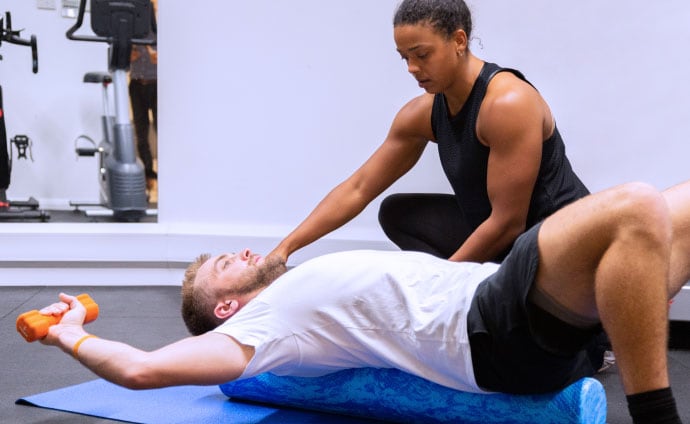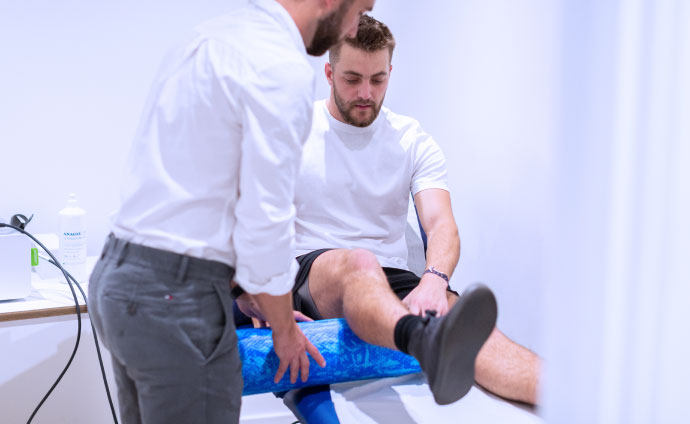Rugby is such a physically demanding sport that even the toughest rugby players can find themselves suffering from general wear and tear or full-blown injuries.
So, whether you’re taking up social rugby or looking to play at a higher level, having a physio on hand to help you prevent injuries before they become an issue for you is crucial.
When you have your first appointment with one of the professional physios at Spectrum we’ll always start by doing a thorough assessment that considers not only your physical condition and symptoms but also your lifestyle and history, to ensure we can formulate a personalised treatment plan that treats your health holistically.
Once we have a solid understanding of how your body is working, in addition to helping sort out any existing niggles, we’ll also look for ways we can improve your strength, conditioning and mobility to set you up for success on the rugby field.
Here are four of the most common rugby injuries that we can help you avoid.

1. Shoulder issues
Rugby requires players to do a lot of reaching tackles, which can put a real strain on your shoulder ligaments and test your long-lever arm strength. Your lat muscles are key in stabilising your shoulders, both when reaching for the ball but also when tackling.
We can give you strengthening exercises to build up the strength of your lats to help secure your shoulder in place. But as shoulders are a mobile joint capable of many different movements, it’s equally important to include mobility exercises to ensure you have ample flexibility in your shoulder joint too.

2. Neck pain
Given that a lot of the time when you’re playing rugby you are bent over in a scrummage, you’re very vulnerable to being tackled slightly off balance, which is why neck and back strength and spinal flexibility are hugely important.
Your neck isn’t naturally really designed to do anything more than hold up your head, so strengthening your neck muscles using guided exercise therapy is a good place to start. A qualified physio will also be able to give you postural tips and technique suggestions for improved spinal health both on and off the field.
Don’t forget that these types of injuries are often related to endurance issues, so even if early on in the season you feel fine, towards the second half of the season or if you increase the amount of times you’re playing or training per week you might start to feel it. So, getting in early with preventative treatments is a smart move.

3. Knee injuries
Knees are another one of the most commonly injured joints found in rugby players, often because people underestimate the complexity of the joint. While you could be forgiven for thinking your knee simply straightens and bends, it’s actually capable of three-dimensional movements. Your physio will be able to assess your current movement capabilities and techniques and work with you to improve any inconsistencies.
You may also be surprised to learn that it’s not solely the joint itself which needs a bit of attention – surrounding major muscles such as your hamstrings and quads, and even your abs, hip flexors and calves play a key role in correctly controlling the way your knee moves – so doing exercises to strengthen and improve the overall health of all these muscles is also wise.

4. Ankle problems
Ankle injuries are common in any sports where direction changes and contact are part of the game, and rugby is no exception. Much like with other joints, strengthening both the joint and the surrounding muscles, such as the calves, will contribute greatly to ensuring you are set up for success before the game even begins.
But wearing appropriate footwear or getting your physio to provide additional support by taping your ankles is also advisable, particularly if you’ve suffered from ankle issues in the past. And never underestimate the importance of properly warming up and cooling down before and after a match or training.
Like any preventative physio, your physician will be relying on the results of your initial assessment and goals to devise a personalised plan to help you start and finish the rugby season injury-free and feeling great.
Ready for your assessment? Book an appointment with Spectrum today and help set yourself up for success next rugby season.



